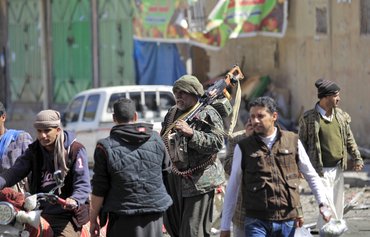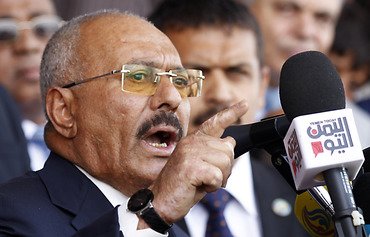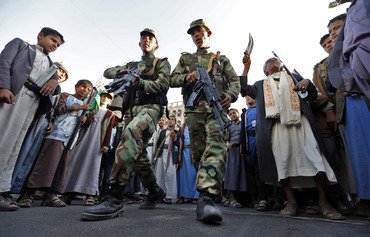The Houthis (Ansarallah) have stepped up their recruitment efforts across Sanaa in anticipation of a popular uprising, Yemeni analysts said.
The recruitment drive comes as part of an undeclared state of emergency, they said, amid fears that violence will flare up on the second anniversary of the slaying of former president Ali Abdullah Saleh.
Saleh's General People's Congress (GPC) was allied with the Iran-backed Houthis until the end of 2017, when it staged a popular uprising against the militia.
The Houthis killed Saleh on December 4th, 2017 in Sanaa, following his call two days earlier for the uprising.
The militia has been setting up new checkpoints and raiding the homes of activists, politicians and social figures known for their loyalty to Saleh.
The Houthis have been anticipating a popular uprising since leaders inside and outside the country called for protests to be staged on the second anniversary of Saleh's killing.
They fear that popular protests elsewhere in the region -- in Lebanon and Iraq -- may contribute to the climate of unrest in Houthi-controlled areas of Yemen.
'Carrot-and-stick approach'
These fears have been compounded by shortages in their military cadres almost five years into the war in Yemen, which is what has triggered the latest recruitment drive.
The recruitment drive has employed a carrot-and-stick approach.
"The Houthis' representative in our neighbourhood has asked us to show the cohesion of the domestic front by guarding our areas and setting up checkpoints," former army officer Abdullah Ahmed told Al-Mashareq.
"If we do not accept this task, this means we will be accused of supporting the Arab coalition, which is encouraging protests," he said. "My peers and I have to comply with this order, or else we will face charges and even detention."
Mohammed Saleh, the son of a city elder, said the Houthis have asked them to conduct inquiries and monitor and report on the movements of members of the GPC in particular.
"One such task is to observe vehicles carrying posters of President Saleh, arrest their owners and smash them," he told Al-Mashareq.
Crackdown on GPC leaders
In late November, the Houthis placed many GPC leaders who had been planning to hold celebrations marking the country's independence day and the second anniversary of Saleh's death under house arrest.
They also imposed restrictions on schools, mosques and social media.
The Houthis have placed the political security and intelligence agencies under their command, political analyst Faisal Ahmed told Al-Mashareq.
The militia has been "suppressing freedoms, monitoring individuals' behaviours and detaining people for months, based on mere suspicions", he said, noting that this has "stoked tensions on the street".
Deteriorating economic conditions and the three-year suspension of public sector salaries also has contributed to the climate of unrest, he added.
"The uprising which President Saleh had called for in December 2017 had created a movement and emboldened people to shake off the fear that the Houthis have sown in society," Ahmed said.
"Based on this, many protests were staged against the Houthis in areas under their control, only because a leader like Saleh was behind them," he said.
"If a leader with political and social weight calls for a new uprising, this will have a great impact," he said. "This explains why the Houthis have placed GPC leaders under house arrest."

![Yemenis carry their belongings as they flee an area in Sanaa on December 3rd, 2017, during clashes between the Houthis and supporters of Yemen's ex-president Ali Abdullah Saleh. [Mohammed Huwais/AFP]](/cnmi_am/images/2019/12/04/21235-yemen-saleh-sanaa-600_384.jpg)






